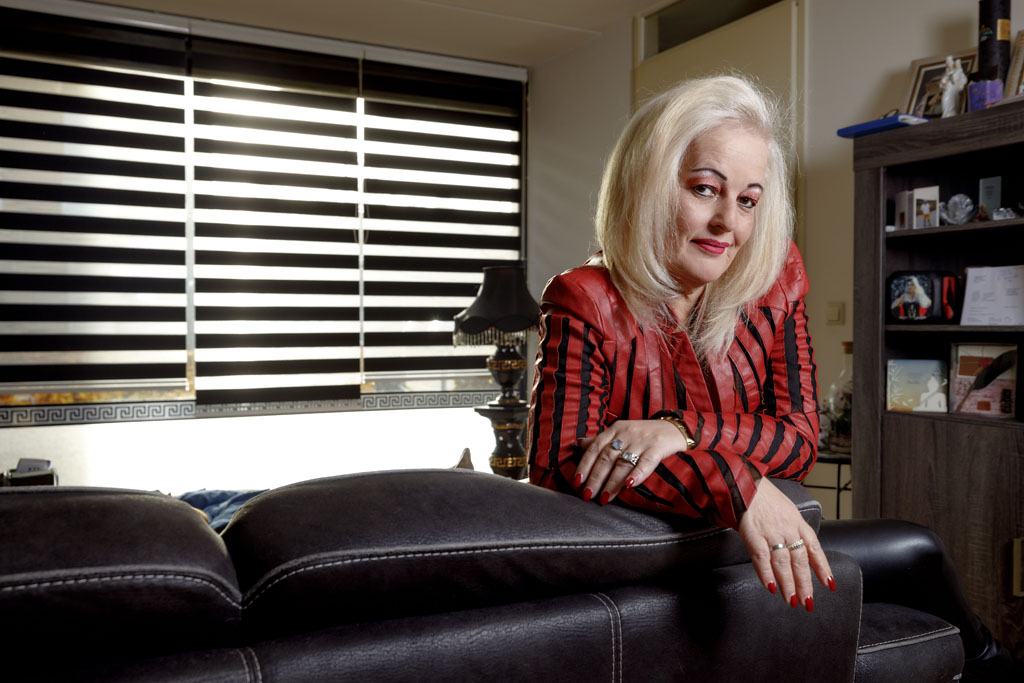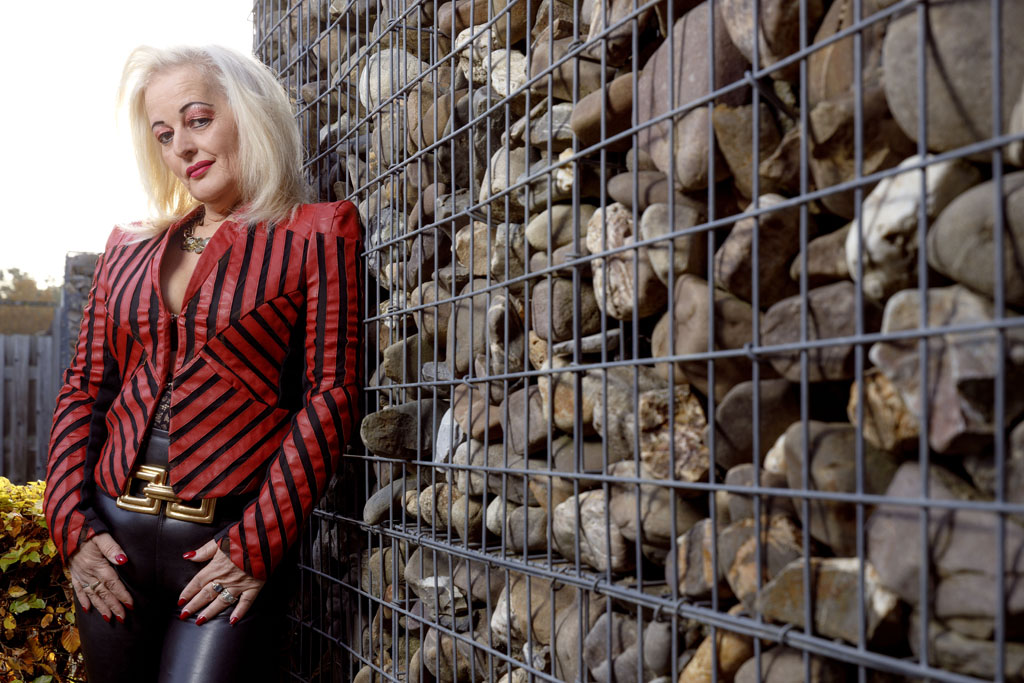Jolanda is being wrecked by her own body: ‘If it weren’t for my complaints, I would be working more than sixty hours’
Expensive medicines and high care bills are a regular source of stress for Jolanda Crucq. She is an informal caretaker for her son Danny, with whom she lives under the same roof. The fact that her welfare was cut five years ago does not make her financial situation any easier. But it does not stop her from doing what she loves best: helping others.

“I can’t work anymore because people need to be able to count on me, which is impossible with such an unpredictable body as mine. I can’t say in advance when my complaints will surface. I would really like to get rid of all my health problems in one go and start working 60 hours. I mean that from the bottom of my heart. I would start my own business tomorrow, in the form of a web shop or clothes shop.
“The chronic problem with us is that we both have quite a few defects. On top of his autism, Danny suffers from heart problems, (severe) anxiety attacks, hypochondria, and irritable bowel syndrome. I myself have borderline issues, am diabetic, and have been living above my stress level since I was young, which results in regular stress attacks. I also suffer from a spastic colon and psoriasis, and I have arthritis in my feet, hands, neck, and back.
“Apart from the fact that I regularly have to lie flat because of this, all these ailments and disorders bring along quite a few medical expenses. Some cream here, a tablet there. If it turns out that your body rejects certain medicines and you have to switch to expensive alternatives that are not covered by the insurance, it gets pretty tough.
Poverty in the Netherlands
What is it like to live in poverty? What does poverty look like nowadays and what can you do about it? This Christmas period, Univers pays special attention to poverty in the Netherlands. People in need of money will be interviewed as well as scientists. Together, they paint a picture of a problem which, unfortunately, is still a long way off from being solved.
This series was made possible with the help of Quiet 500, an organization dedicated to helping people in situations of poverty in the Netherlands. Do you want to help? Visit the website and see what you can do.
“Because I have been declared unfit for work, I receive a monthly invalidity benefit (WAO) of 723 euros. This amount was higher at first but was reduced due to the ‘cost-sharing housemate standard’ from the moment Danny turned eighteen and became eligible for the Wajong (disability assistance). At the same time, child benefit and alimony also lapsed while living expenses remained the same or even increased. This left me in a hole that I’m still in, five years later.
“With my WAO I can barely pay my recurring expenses, let alone my health care premiums. As a result, I talk to my health insurer every month and tell them I can’t manage again. Fortunately, they are flexible and understanding. However, I cannot say the same about the Tilburg Municipality, with whom I have been at odds for years. It is about an extra 180 euros per month with which I could pay all my bills. They refuse to give this. This makes me combative and resourceful, and I turn into a pitbull.”
Wonder Woman
“From the age of fourteen until the age of thirty-five I worked at the Albert Heijn supermarket. In fact, I have worked the entire ‘Appie’: from cashier to cheese seller to shelf stocker. It always went well until, one day, I literally collapsed from the stress and ended up in an ambulance. I have been at home ever since.
“Because I still want to be meaningful in the moments that my body allows it, my time mainly consists of helping others who are in the same situation. I do this in different ways. For example, I help people who are not able to use their computer properly or who have problems with their bookkeeping. That is who I am, I like to take care of others. That’s why they call me Wonder Woman.
‘I know what it’s like to do everything on your own’
Jolanda Crucq
“Just the other day, I saw a homeless man sitting by the side crying. I just couldn’t resist. I gave him a stroke on his cheek and the last five euros from my wallet. He was very grateful. What I mean to say with this is that it can always be worse. I have nothing to spend, but he certainly does not.
“Sometimes I get asked why I do this, when I have so much shit going on myself. My answer is that I get satisfaction from it. I know better than anyone what it’s like to do everything on your own and to have to go through life without backup. It’s really nice when you get help from someone, in whatever form. That’s the advantage if you’ve been through a lot in your life, then you become a kind of expert by experience and you can help other people better.”
Nibble
“Because my benefit is used up by the recurring expenses, we live off Danny’s Wajong. But that’s becoming increasingly difficult because everything is becoming more expensive while the amount we receive remains the same. Not only are the prices of gas, water, and electricity rising, but also of groceries and petrol—it really isn’t normal. For a while I ate little or nothing to keep the costs down. Then I only drank protein shakes. That way I saved money and could assure that Danny had a normal meal.

“Although this is no longer the case, I still depend on others for many things. For example, I got my car from my father, and when it breaks down, he pays the repair costs. Clothes I get from my sister and friend. If they have something they don’t wear anymore, I get it.
“Also, you have organizations like Quiet that organize raffles that you can sign up for. For example, I recently won a brand-new set of pans. I was very happy about that because I had very old pans, which is the sort of thing you skimp on. You don’t just go to Blokker and buy a set of pans for hundreds of euros. The same goes for holidays, the last time was over ten years ago.”
Talk about it
“My situation is more common than people realize. People just don’t talk about it because poverty is a taboo. Why is that? We don’t like to look into other people’s financial situation, that’s private. In addition, some people are ashamed of the fact that they have little money. They are afraid of what those around them will think of them.
“I understand that because there are many prejudices attached to people in poverty. One of the most serious is that they have ended up there through their own fault: ‘if only you hadn’t done this or if only you hadn’t done that.’ Easy to say that, of course, especially when you don’t even know someone.
“Fortunately, I can easily brush off this kind of comment because I know it’s not true. There has never been anything wrong with my spending pattern, for accounting I always had an eight or nine. So, I have never been ashamed of my being poor and tell it to anyone who wants to hear it.
“Talking about it can sometimes also open the other person’s eyes. It creates understanding for your situation, which is nice. Bottling up is not good anyway and can cause a lot of extra stress. Talking about it out offers relief. That’s something I want to pass on to anyone living in poverty: be open and honest about it, that really helps. It may not solve anything, but it does lighten the mood.






